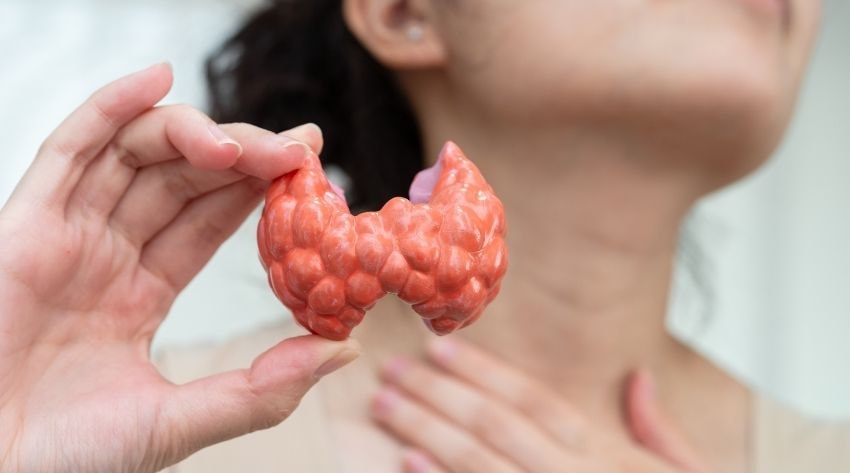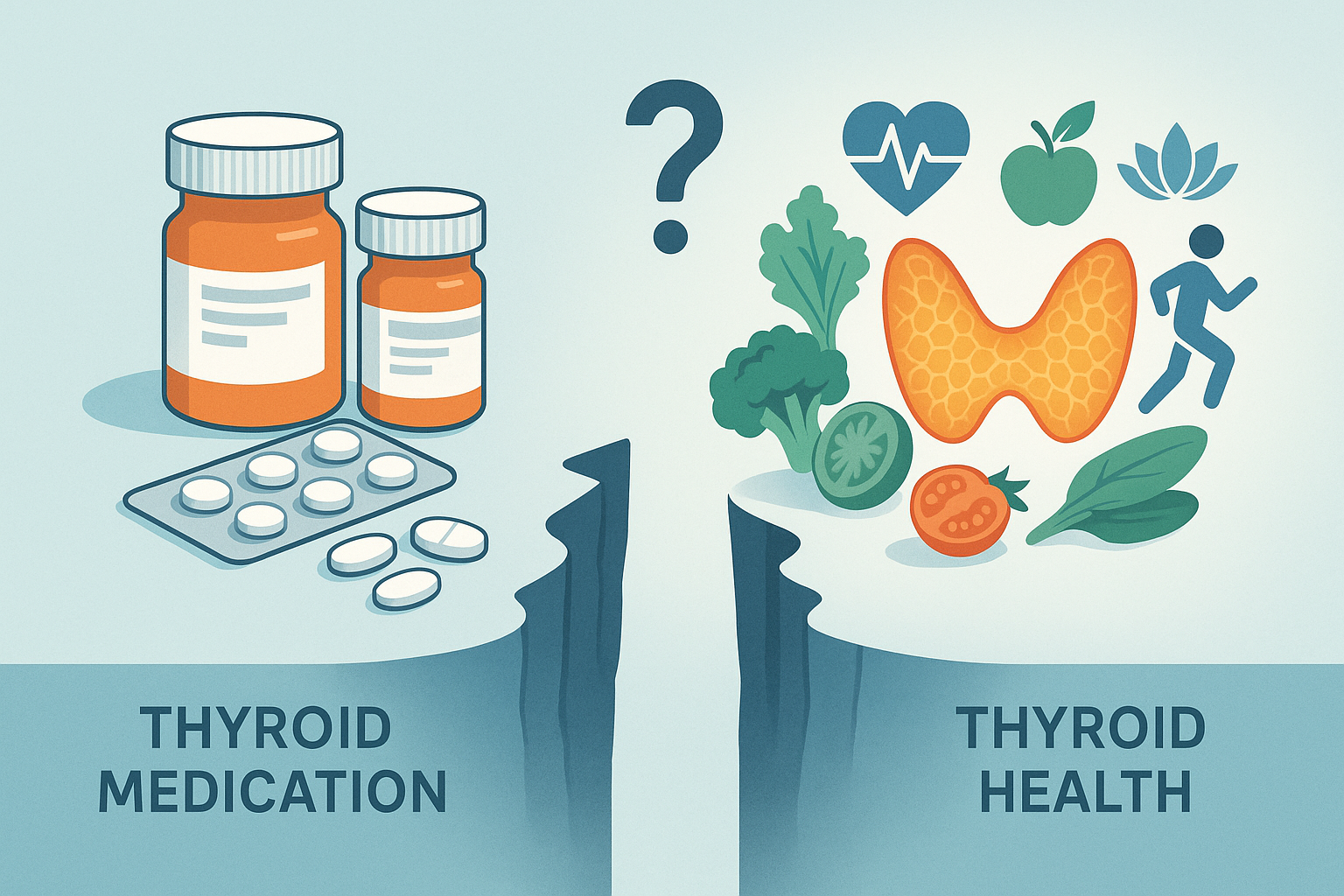It all starts with inflammation.
Your immune system produces antibodies—like peroxidase antibodies—that target your thyroid tissue. Immune cells infiltrate the gland, creating chronic damage that can eventually slow down hormone production, leading to hypothyroidism. That’s when disease symptoms like fatigue, brain fog, hair loss, and stubborn weight gain set in, and these symptoms can vary in severity.
Here’s the twist: these antibodies often show up years before you feel symptoms. That means there’s a huge window where diet, supplements, and lifestyle changes could make a real difference.
And that’s what I'm discussing in this article —the most science-backed supplements for Hashimoto’s. I'm not talking about vague wellness trends. I'm going deep into clinical studies, optimal dosages, and real safety considerations so you can make informed decisions.
Did you know....
Selenium supplementation alone has been shown to cut thyroid antibody levels by up to 50%. That’s huge. Selenium deficiency can contribute to developing Hashimoto's Disease by impairing thyroid hormone conversion and triggering autoimmune responses.
Why Your Immune System Needs Support
Your thyroid is your body’s metabolic thermostat. It regulates energy, hormone balance, and even brain function. When it’s off, everything’s off. A healthy thyroid means steady energy, mental clarity, healthy weight management, and a balanced mood.
Yes, medication can help restore thyroid hormone levels—but without supporting your immune system, reducing inflammation, and filling in nutrient gaps, you’re only addressing part of the problem.
Introduction to Thyroid Health

Thyroid health is the cornerstone of your body’s overall well-being.
The thyroid gland, a small butterfly-shaped organ at the base of your neck, is responsible for producing thyroid hormones that regulate metabolism, energy levels, and hormonal balance. When your thyroid is functioning optimally, you feel energetic, maintain a healthy weight, and enjoy stable moods. However, thyroid diseases—such as Hashimoto’s disease—can disrupt this delicate balance, leading to symptoms like fatigue, weight gain, and hair loss.
Maintaining normal thyroid function is essential for preventing thyroid disorders and supporting your body’s natural processes. A healthy diet, rich in essential nutrients, plays a vital role in keeping your thyroid gland in top shape. Additionally, some "healthy" foods could be making your thyroid symptoms worse.
Nutrients like selenium and vitamin D are especially important; they help regulate immune system activity and protect the thyroid from damage. For many people, dietary supplements can provide additional support, especially if nutrient deficiencies are present or if you’re managing an autoimmune thyroid disease.
Thyroid Function Lab Tests and Diagnosis
Accurate diagnosis and monitoring of thyroid diseases, including Hashimoto’s disease, rely on a series of thyroid function laboratory tests. These lab tests measure important thyroid hormone levels in your blood, such as thyroid-stimulating hormone (TSH), free thyroxine (FT4), free triiodothyronine (FT3), Reverse T3, and Thyroid Antibodies. Unfortunately most doctors only test TSH and T4 which don't tell the whole story. As a result, the doctor may tell you that you are "normal", and you feel awful. Evaluating all of these markers helps determine whether your thyroid gland is functioning normally or if there are signs of an underactive or overactive thyroid.
A diagnosis of Hashimoto’s disease is usually based on a combination of clinical symptoms, your medical history, and laboratory findings. One of the key indicators is the presence of thyroid autoantibodies, which signal that the immune system is attacking the thyroid gland.
Thyroid function tests can reveal subtle changes in hormone levels even before symptoms become obvious, allowing for early intervention and better management. Subclinical hypothyroidism is a common finding in early Hashimoto’s disease, and monitoring for it can help guide timely treatment decisions.
But that isn't the end of the story; your thyroid function depends on your gut function, liver function, and even your cells' response to thyroid hormones. In other words, your cells may be more or less sensitive to the thyroid hormones compared to someone with the same lab results.
How you feel is an integral part in the diagnosis.
It’s essential to work closely with a healthcare provider to interpret your thyroid function tests and develop a treatment plan tailored to your needs. Untreated thyroid diseases can lead to serious complications, such as heart problems and worsening symptoms, so regular monitoring and timely adjustments to your care are crucial for maintaining thyroid health.
Why T4-Only Thyroid Hormone Medication Rarely Works for Hashimoto’s
If you’ve been diagnosed with Hashimoto’s, chances are you were prescribed levothyroxine—a synthetic T4 medication—and told it would “fix” your thyroid. For some, it helps… at least at first. However, it's important to know that certain foods, medications, and supplements can interfere with your body's ability to absorb levothyroxine, so timing and interactions are crucial for proper effectiveness. But here’s the problem:
T4 is an inactive hormone. Your body has to convert it into Free T3, the active form that actually powers your metabolism, brain, mood, and energy. That conversion happens mostly in the liver and gut—two systems often impaired in Hashimoto’s due to inflammation, nutrient deficiencies, toxin overload, and sluggish detox pathways.
This means that even with “normal” TSH on paper, many patients remain tired, cold, foggy, depressed, and unable to lose weight—because their Free T3 is too low, and their Reverse T3 (the “brake pedal” hormone) is too high.
Here’s the truth your labs might be hiding:
-
If your Free T3 is low, your cells can’t use thyroid hormone effectively—no matter how much T4 you take. Taking too much thyroid hormone can also cause adverse effects, so careful dosing is essential.
-
If your Reverse T3 is high, it blocks Free T3 from binding to your receptors, keeping you in a hypothyroid state.
-
Without addressing liver health, gut integrity, nutrient status, and autoimmune inflammation, medication alone often leaves people stuck. In clinical practice, medication is frequently combined with other interventions for optimal management.
The Gaps That Medication Misses

1. Poor T4-to-T3 Conversion
-
80% of T3—your active thyroid hormone—is converted from T4 in the liver and gut, not the thyroid itself.
-
If your liver is congested or your gut is inflamed, conversion stalls.
-
Result? Low Free T3, high Reverse T3, and persistent hypothyroid symptoms.
2. Autoimmune Inflammation
-
Hashimoto’s isn’t just “low thyroid”—it’s your immune system attacking your thyroid tissue.
-
Inflammation disrupts hormone production and keeps antibody levels high.
3. Nutrient Deficiencies
-
Without adequate iodine, selenium, zinc, copper, and iron, your thyroid can’t make or activate hormones.
-
Low copper means your iron isn’t usable—leaving you tired even if your ferritin looks fine.
Gut Dysfunction
-
Leaky gut fuels autoimmunity and blocks nutrient absorption.
-
70% of your immune system is in your gut—if it’s inflamed, your thyroid will be too.
-
Toxins, heavy metals, mold, and halogens block thyroid hormone receptors and clog the liver.
-
If your detox pathways aren’t open, nothing moves—hormones, toxins, or progress.
This is why a root-cause, multi-system approach is essential.
Nutrients & Systems That Medication Can’t Fix
Hashimoto’s isn’t just a thyroid problem—it’s an immune system problem that affects digestion, detoxification, adrenal function, and hormone balance. Thyroid autoimmunity plays a central role in the development of this condition, and addressing it often requires a comprehensive approach.
People with Hashimoto's often benefit from supplement strategies tailored to their unique immune and metabolic challenges. Multiple supplements, such as selenium, vitamin D, and Myo-inositol, are often used together to target thyroid autoimmunity, and other supplements may be considered as adjuncts to primary therapies. These supplement strategies are increasingly being integrated into clinical practice. The supplements below are designed to address these deeper layers so your thyroid can actually work.
Acceleradine® Iodine – The Thyroid’s Missing Mineral
When sourced and dosed correctly, iodine is a game-changer for Hashimoto’s—despite mainstream fear. Acceleradine® is monoatomic, scalar-charged, and 100% bioavailable, allowing for safe halogen detox and hormone synthesis.
Iodine itself is scientifically proven to assist the thyroid gland by helping:
-
Displaces fluoride, bromine, and chlorine that block thyroid receptors
-
Supports natural production of T4 and T3
-
Powers mitochondrial energy for better mood, metabolism, and immunity
-
Enhances immune system accuracy, potentially reducing autoimmune misfires
Accelerated Thyroid® – Nourishment, Not Stimulation
A synergistic blend of grass-fed glandulars, adaptogens, tyrosine, and cofactors—scalar-charged to help support thyroid and adrenal balance without overstimulation.
Benefits for Hashimoto’s:
-
Ingredients scientifically proven to restore building blocks for T4 and T3
-
Ingredients help to improves adrenal resilience, reducing stress-driven hormone disruption
-
Ingredientsa help to calm inflammation while gently improving metabolic function
Accelerated Liver Care™ – The T4-to-T3 Converter
Your liver is where most of your T4 converts into active Free T3. A congested liver can sabotage even the best medication.
How it supports Hashimoto’s:
-
Ingredients scientifically proven to help enhances bile flow for toxin and hormone clearance
-
Ingredients supports both Phase I and Phase II detox pathways
-
Ingredients help to promotes regeneration of damaged liver cells
-
Ingredients help to improve T4-to-T3 conversion and lowers Reverse T3
Accelerated Scalar Copper® – The Iron Regulator & Oxygen Optimizer
Iron metabolism is one of the most overlooked pieces in thyroid care. Too much or too little iron can disrupt hormone production, fuel oxidative stress, and worsen fatigue. Here’s the kicker—iron can’t be properly used by your body without bioavailable copper.
Copper activates ceruloplasmin, the enzyme that keeps iron in motion, prevents it from rusting in your tissues, and delivers it to your cells where it fuels oxygen production. For thyroid patients, this is huge—because oxygen is required for mitochondrial energy and hormone synthesis.
How copper helps Hashimoto’s patients:
-
Balances iron levels naturally—preventing both anemia and toxic iron overload
-
Supports mitochondrial function for steady energy
-
Reduces oxidative stress that fuels autoimmune flares
-
Enhances collagen production for hair, skin, and connective tissue health
-
Improves oxygen delivery to tissues, supporting metabolism and brain clarity
MegaSporeBiotic® – The Gut-Immune Reset
With 70% of the immune system in the gut, fixing intestinal permeability is essential for calming autoimmunity.
Potential Benefits:
-
Seals the gut lining, reducing immune overactivation
-
Balances gut bacteria to improve nutrient absorption
-
May help reduce the severity of disease symptoms in Hashimoto's by supporting a healthier microbiome
-
Reduces systemic inflammation markers like IL-6 and TNF-α
HCl Guard® – The Nutrient Absorption Booster
Low stomach acid is almost universal in Hashimoto’s and prevents absorption of key nutrients—zinc, selenium, iron, iodine, B12—needed for thyroid repair.
Potential Benefits
-
Improves protein digestion
-
Enhances mineral and vitamin absorption
-
Reduces bloating, food sensitivities, and gut inflammation
“Thyroid Support” Supplements That Can Backfire with Hashimoto’s
If you have Hashimoto’s, you’ve probably heard that herbs and botanicals like ashwagandha, turmeric, NAC, or glutathione can “support” thyroid health. On paper, they sound beneficial. In reality, many can quietly make symptoms worse.
-
Turmeric / Curcumin – Anti-inflammatory, but also high in oxalates, which can aggravate joint pain, kidney stress, and thyroid inflammation in those who can’t process them well.
-
NAC & Glutathione – Both are sulfur donors. If you have sulfur sensitivity, they can overwhelm detox pathways and trigger more fatigue, inflammation, and brain fog.
2. Not All Botanicals Are Safe for Autoimmunity
-
Ashwagandha – Can overstimulate the thyroid in people with hyperthyroidism or cause hormone fluctuations in sensitive individuals. May not be ideal for all autoimmune cases.
-
Bladderwrack (Fucus vesiculosus) The iodine content is variable and can be contaminated with heavy metals.
3. Poor Quality and Contamination Risks
-
Many supplements are poorly formulated, using ineffective forms or wrong dosages.
-
Some are contaminated with mold or bacteria, particularly mass-produced herbal powders.
-
Independent testing often shows that what’s listed on the label is not what’s in the bottle—sometimes delivering little to none of the active ingredient.
Bottom line:
The wrong supplement can worsen inflammation, disrupt hormone balance, or add to your toxic load. Supporting Hashimoto’s requires products that are clean, tested, and tailored to your unique biochemistry—otherwise you may be fueling the autoimmune fire you’re trying to put out.
Clinical Trials and Research
Ongoing clinical trials and research are expanding our understanding of thyroid diseases, including Hashimoto’s disease, and paving the way for new therapeutic strategies. Many clinical trials specifically focus on Hashimoto’s thyroiditis to better understand its pathophysiology and treatment strategies. Subclinical hypothyroidism is also a frequent subject of research, as early intervention can prevent progression to overt hypothyroidism.
Why Supplement May Work When T4 Alone Doesn’t
By restoring copper-iron balance, supporting iodine sufficiency, healing the gut lining, and optimizing liver detox, this protocol helps your body:
-
Produce enough T4 and T3 naturally
-
Convert T4 into Free T3 efficiently
-
Lower Reverse T3 so active hormone can reach your cells
-
Calm autoimmune activity and reduce antibody levels
-
Optimize selenium levels and use selenium supplements to help reduce thyroid antibodies and improve symptoms
-
Address vitamin D deficiency, which is important for immune regulation and further symptom improvement
-
Regain energy, mood stability, and metabolic health
When you address these missing pieces, your thyroid medication—if you still need it—works better, and many people can even reduce their reliance on it over time under practitioner supervision.
Thyroid Diet and Nutrition
A well-balanced, nutrient-rich diet is a powerful tool for supporting thyroid health and managing thyroid diseases like Hashimoto’s disease. The thyroid gland relies on specific nutrients to produce hormones and maintain normal function. Iodine is essential for thyroid hormone synthesis, while selenium helps protect the thyroid from oxidative damage and supports hormone conversion. Vitamin D is also critical, not only for bone health but for regulating the immune system and reducing inflammation.
Following a thyroid diet means focusing on whole, unprocessed foods that provide these key nutrients. Incorporate seafood, wild animal protein for a broad spectrum of easily assimilated nutrients, and aim for regular sun exposure or vitamin D-rich foods to maintain healthy levels. A healthy diet can help ease common symptoms of thyroid diseases, such as fatigue and weight gain, and support your immune system.
It’s also important to be mindful of foods that may interfere with thyroid function. Foods containing oxalates, such as spinach, kale, almonds, most nuts, berries, and turmeric are mistaken as "health foods" but can actually slow down the thyroid and worsen Hashimoto's symptoms.
Furthermore, foods that contain sulfur such as garlic, onions, cruciferous vegetables and egg yolks could back up the liver's detox pathways, worsening thyroid health.
Some people with thyroid disorders should limit soy, as well as processed foods and added sugars, which can contribute to inflammation. For the best results, follow the Accelerated Food Guide and choose nutrient dense foods without elements that may backfire on thyroid health.
Conclusion and Future Directions
Thyroid diseases, including Hashimoto’s disease and hypothyroidism, are complex conditions that require a comprehensive, individualized approach to management.
Looking ahead, future research is needed to further unravel the pathogenic mechanisms underlying thyroid diseases and to develop innovative therapeutic strategies. The gut microbiome’s influence on thyroid function and immune system regulation is a particularly promising area of study, with the potential to reveal new ways to support thyroid health through diet and targeted supplementation.
Thyroid hormone therapy, such as T-3 hormone replacement, can be effective but may cause side effects if not properly managed. Too much thyroid hormone can lead to symptoms such as rapid heartbeat and irregular heartbeat, so careful monitoring is essential.
Ultimately, the best outcomes for people with thyroid diseases are achieved through a multidisciplinary approach that combines medical treatment, dietary modifications, and lifestyle changes. These strategies are relevant for a range of thyroid conditions, not just Hashimoto's.
Healing from Hashimoto’s isn’t about attacking the immune system—it’s about rebalancing and rebuilding. When you remove the immune triggers (halogens, gut inflammation, toxins), restore nutrient absorption, and support thyroid and liver synergy, your body stops attacking itself. That’s when you see energy return, hair regrow, mood lift, and inflammation cool.
This isn’t a quick fix—it’s a long-term restoration of your thyroid, metabolism, and immune balance.



